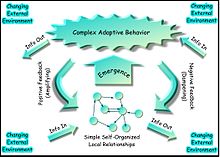Complex adaptive system
Complex adaptive systems ( KAS ) are a special case of complex systems . They are complex because they consist of several interrelated elements. They are adaptive because they show a special ability to adapt to their environment and have the opportunity to learn (from experience). The name complex adaptive systems was developed in the interdisciplinary Santa Fe Institute by John H. Holland , Murray Gell-Mann, and others. Holland is another later inventor of the evolutionary algorithm , which was developed and supported mathematically in 1973 by Ingo Rechenberg (Rechenberg, 1973). The name John Holland is associated with the introduction of the genetic algorithm , which was originally developed by Nobel Prize winner Gell-Mann , actually the discoverer of quarks .
The term complex adaptive systems (also called complexity theory ) describes a broad academic field. The complexity theory is not a single theory, it includes more than one theoretical framework and is highly interdisciplinary, by seeking answers to fundamental questions of living, adaptable, changeable systems.
Examples of such complex adaptive systems are the stock market , social insects and ant colonies , the biosphere and ecosystem , the brain and immune system , the cell and embryonic development , companies for manufacturing and services , groups in social systems such as political parties and communities . A special case of a complex adaptive system is a socio-ecological system , for example in ecology.
There is a close relationship between complex adaptive systems and artificial life . The principles of emergence and self-organization are very important in both areas .
Definitions
A complex adaptive system is a complex, self-similar collective of interacting adaptive actors.
- John H. Holland : "Cas [complex adaptive systems] are systems that have a large numbers of components, often called agents, that interact and adapt or learn."
properties
What distinguishes complex adaptive systems from pure multi-agent systems are properties such as self-similarity , complexity , emergence and self-organization . A multi-agent system is simply defined as multiple, interacting agents. In complex adaptive systems, both the agents and the system are adaptive: the system is self-similar. A complex adaptive system is a complex, self-similar collective of interacting adaptive agents.
Other important properties are adaptation (sometimes called homeostasis ), communication , specialization , spatial and temporal organization, and of course reproduction . They show up on all levels: cells specialize, adapt and reproduce just like larger organisms. Communication and cooperation take place at all levels, from the agent to the system level.
literature
- Manfred Stüttgen: Complex adaptive systems - or: what we can learn from complexity theory for the organization of companies. In: Peter Milling (Ed.): Deciding in complex systems. Berlin 2002, ISBN 3-428-09365-8 , pp. 333-348.
- Manfred Stüttgen: Strategies for managing complexity in companies. A transdisciplinary frame of reference. Second edition. Bern 2003, ISBN 3-258-06702-3 .
- Murray Gell-Mann : The Quark and the Jaguar. From the simple to the complex - the search for a new explanation of the world . Piper, Munich a. a. 1994, ISBN 3-492-22296-X .
- Ingo Rechenberg : evolution strategy . Frommann-Holzboog Verlag, Stuttgart 1973, ISBN 3-7728-0373-3 .
Web links
- What are Complex Adaptive Systems? Complex Adaptive Systems Group at Iowa State University (English)
- Complexity Explorer: Website with online courses and introductions to complexity research and complex systems from the Santa Fe Institute
Individual evidence
- ^ John H. Holland : Studying Complex Adaptive Systems. In: Journal of Systems Science and Complexity. Volume 19, No. 1, March 2006, ISSN 1009-6124 , pp. 1-8, doi: 10.1007 / s11424-006-0001-z .
